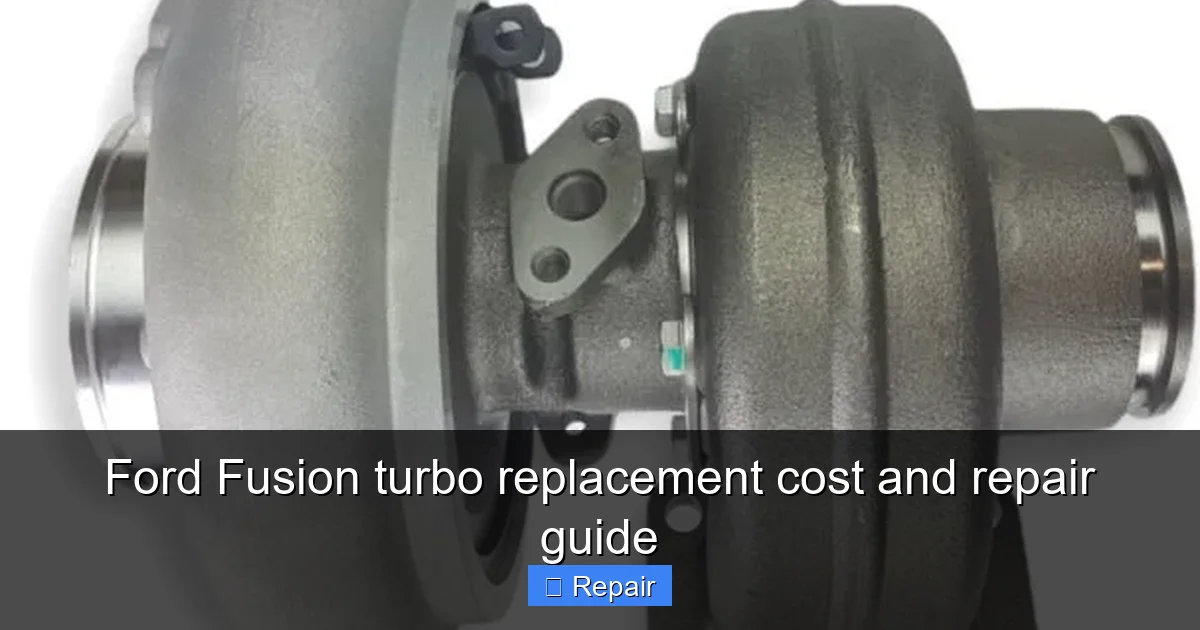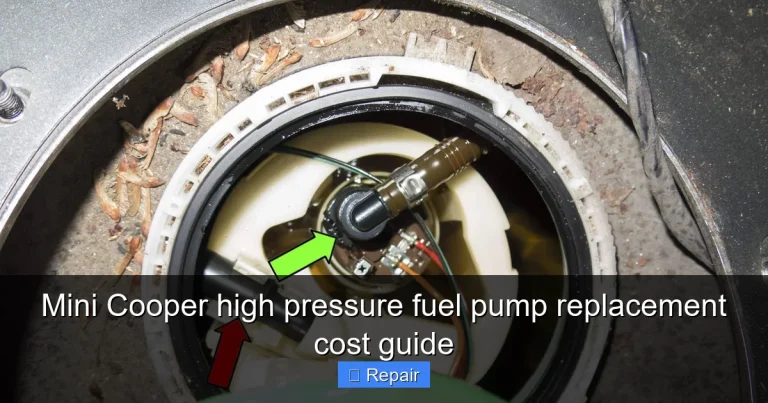Ford Fusion turbo replacement cost and repair guide
Ford Fusion turbo replacement typically costs between $1,500 and $3,000, depending on model year, labor rates, and whether you choose OEM or aftermarket parts. Understanding what drives this price—parts, labor time, and related components like gaskets and lines—helps you budget accurately and decide if a full replacement, rebuild, or used turbo is the smartest move for your Fusion.
Ford Fusion turbo replacement cost and repair guide
If your Ford Fusion has started to whistle, smoke, or feel slow and lazy, there’s a good chance the turbo is trying to tell you something. Turbo problems are stressful, because we all know one thing: they are not cheap. But “not cheap” can mean a lot of different numbers, and that’s where things get confusing.
This guide breaks down real-world Ford Fusion turbo replacement cost ranges, what affects the price, and how to avoid spending more than you need to. I’ll walk through the signs of a failing turbo, repair options, and a few money-saving tips I wish more people knew before they handed over their credit card.
Whether you’re driving a 1.5L EcoBoost Fusion or a 2.0L turbo model, the basics are the same. By the end, you’ll have a clear idea of what to expect, what questions to ask your mechanic, and how to decide if the repair is worth it for your car.
Key Takeaways
- Average Ford Fusion turbo replacement costs typically range from $1,200 to $2,500 including parts and labor.
- Labor makes up a large portion of the bill, so comparing shop hourly rates can significantly reduce costs.
- OEM turbos cost more but usually offer better reliability and warranty than cheaper aftermarket options.
- Early diagnosis saves money by preventing collateral damage to the engine and exhaust system.
- Watch for warning signs like whining noises, power loss, smoke, or check-engine lights to catch turbo issues early.
- Ask for a detailed estimate that separates parts, labor, taxes, and extra services before approving repairs.
- Regular oil changes and quality oil are the easiest ways to extend turbo life and avoid replacement.
Quick Answers to Common Questions
How much does a Ford Fusion turbo replacement cost on average?
The average Ford Fusion turbo replacement cost typically ranges from $1,200 to $2,500, including parts and labor, depending on model year and shop rates.
What affects the Ford Fusion turbo replacement cost?
Your Ford Fusion turbo replacement cost can go up or down based on whether you use OEM or aftermarket parts, local labor rates, and if any related components like gaskets or lines also need replacing.
Is it cheaper to rebuild or replace a Ford Fusion turbo?
Rebuilding can sometimes be cheaper than the full Ford Fusion turbo replacement cost, but a brand-new turbo often offers better reliability and a longer warranty.
Can I drive with a failing turbo on my Ford Fusion to avoid replacement cost?
Driving with a failing turbo may save money short term, but it can cause engine damage and lead to a much higher Ford Fusion turbo replacement cost later.
Does warranty or insurance ever cover Ford Fusion turbo replacement cost?
If your car is still under powertrain warranty or you have an extended warranty, some or all of the Ford Fusion turbo replacement cost may be covered, but standard insurance usually does not pay for wear-and-tear failures.
📑 Table of Contents
- Understanding Ford Fusion turbo replacement cost
- Common signs your Ford Fusion turbo is failing
- Detailed breakdown of Ford Fusion turbo replacement cost
- Repair options: dealer, independent, or DIY?
- How the turbo is replaced (and what to ask your mechanic)
- Saving money and extending turbo life
- Conclusion: is a turbo replacement worth it for your Fusion?
Understanding Ford Fusion turbo replacement cost
Typical price range for a Ford Fusion turbo
Let’s get straight to the point. A Ford Fusion turbo replacement cost usually falls into these ranges (parts and labor together):
- Independent shop: about $1,400 – $2,300
- Ford dealership: about $1,900 – $3,200
- DIY (if you’re experienced): about $700 – $1,400 in parts
These numbers apply mostly to 1.5L and 2.0L EcoBoost turbo engines, which are the most common turbocharged Ford Fusion models. Older or less common engine codes may vary a bit, but the pattern is similar.
Parts vs labor: where the money goes
When you hear a Ford Fusion turbo replacement cost estimate, it helps to split it into two buckets:
- Turbocharger unit: usually $600 – $1,400 depending on brand and whether it’s new or remanufactured
- Labor: usually $600 – $1,000 depending on shop rate and how rusty or cramped things are
Labor is high because the turbo sits in a tight spot, surrounded by hot exhaust parts and coolant lines. Getting to it, unbolting it without snapping studs, and then reinstalling everything takes time and patience.
Why quotes can vary so much
You might call three shops and get three very different numbers. That’s normal. A Ford Fusion turbo replacement cost can change because of:
- Shop type: dealership vs independent vs mobile mechanic
- Location: big city labor rates vs small town rates
- Parts choice: OEM Ford turbo vs aftermarket vs remanufactured
- Extra parts: gaskets, studs, oil lines, coolant, and sometimes a new catalytic converter
- Hidden damage: seized bolts, damaged exhaust studs, or oil contamination
If one quote seems way cheaper than the others, ask what’s included. Sometimes the “cheap” quote leaves out important items like new gaskets or oil feed lines, which can bite you later.
Common signs your Ford Fusion turbo is failing
Performance symptoms you’ll feel while driving
Most people first notice turbo issues when the car just doesn’t pull like it used to. Here are common signs:

Visual guide about ford fusion turbo replacement cost
Image source: carcarecamp.com
- Loss of power: the car feels slow, especially when merging or going uphill
- Boost comes late: you press the gas, and nothing much happens until higher rpm
- Poor acceleration: Fusion feels “heavy” or sluggish compared to before
If you drive your car every day, you’ll usually feel this before you see any warning lights.
Noises that point to turbo trouble
A failing turbo often makes itself heard. Listen for:
- High-pitched whistle: especially under boost, like a tea kettle or siren
- Grinding or scraping: can mean internal turbo damage
- Loud whooshing: may be a boost leak from a loose clamp or cracked hose
A little turbo whistle can be normal on some cars, but a sudden new sound is a red flag.
Smoke and warning lights
Visual signs are usually more serious and harder to ignore:
- Blue or gray smoke from the exhaust, especially under acceleration
- Burning oil smell from the engine bay or tailpipe
- Check engine light with codes related to boost pressure, misfire, or rich/lean mixture
On some Ford Fusions, you might also see a message like “Engine fault, service now” or feel the car go into limp mode to protect itself.
When a bad turbo affects other parts
A worn turbo can send metal shavings or oil into other parts of the engine. That’s where the Ford Fusion turbo replacement cost can jump. Examples include:
- Oil contamination reaching bearings or timing components
- Excess oil clogging the catalytic converter
- Boost leaks causing the engine to run too rich or too lean
This is why some shops recommend extra cleaning or parts when they quote a turbo job. It’s not always upselling; sometimes it’s prevention.
Detailed breakdown of Ford Fusion turbo replacement cost
Typical cost ranges by engine and shop type
Below is a rough guide for Ford Fusion turbo replacement cost by engine size and shop type. These are estimates, not exact quotes, but they help you see where your number might land.
| Engine / Shop Type | Parts Cost (Turbo + Basics) | Labor Cost | Estimated Total |
|---|---|---|---|
| 1.5L EcoBoost – Independent shop | $650 – $1,100 | $600 – $900 | $1,250 – $2,000 |
| 1.5L EcoBoost – Ford dealer | $900 – $1,400 | $800 – $1,100 | $1,700 – $2,500 |
| 2.0L EcoBoost – Independent shop | $700 – $1,200 | $650 – $950 | $1,350 – $2,150 |
| 2.0L EcoBoost – Ford dealer | $950 – $1,500 | $850 – $1,200 | $1,800 – $2,700 |
| DIY (experienced, any turbo Fusion) | $600 – $1,400 | $0 | $600 – $1,400 |
Again, your actual Ford Fusion turbo replacement cost might sit just outside these ranges, but this gives you a realistic ballpark.
Extra parts that often get added
Most turbo jobs need more than just the turbo. Shops often include:
- Gasket set: turbo to manifold, turbo to downpipe, oil and coolant line seals
- New hardware: studs, nuts, and bolts that are heat-cycled and rusty
- Oil and filter: fresh oil is a must after turbo work
- Coolant: if the turbo is water-cooled, some coolant will be drained
- Oil feed and return lines: sometimes replaced as a precaution
All of this can add another $100 – $300 to the Ford Fusion turbo replacement cost, but skipping these items can increase the risk of leaks or early failure.
OEM vs aftermarket vs remanufactured turbos
The type of turbo you choose has a big impact on cost and reliability.
- OEM (Ford / Motorcraft):
- Usually the most expensive
- Best fit and reliability
- Often comes with a solid warranty
- Aftermarket (new):
- Cheaper, especially from lesser-known brands
- Quality can be hit or miss
- Good brands can be a nice middle ground
- Remanufactured:
- Existing turbo rebuilt with new internal parts
- Usually cheaper than brand-new OEM
- Quality depends on who rebuilt it
If you plan to keep the car for a long time, spending more on a quality turbo can save you from doing the job twice.
Repair options: dealer, independent, or DIY?
Ford dealer service: pros and cons
Going to a Ford dealer for a turbo job has some clear upsides:
- Technicians familiar with the Fusion and EcoBoost engines
- Access to the latest service bulletins and updates
- Genuine OEM parts and clear warranty coverage
The trade-off is cost. A dealer’s Ford Fusion turbo replacement cost is usually a few hundred dollars higher than a good independent shop. You’re paying for brand, overhead, and sometimes a nicer waiting room.
Independent shops: often the sweet spot
A trusted independent repair shop can be the best balance of cost and quality. Benefits include:
- Lower labor rates than dealers in most areas
- Flexibility to use OEM, aftermarket, or reman parts
- More willingness to explain options and work with your budget
When you call around, ask specifically, “What’s your experience with EcoBoost turbo replacements on Ford Fusions?” A shop that has done several will work faster and usually with fewer surprises.
DIY turbo replacement: when it makes sense
If you have tools, space, and some experience with engine work, you might be tempted to save money by doing it yourself. It can cut the Ford Fusion turbo replacement cost by hundreds of dollars, but it’s not a beginner job.
Things to consider before going DIY:
- You’ll be working in tight spaces with hot-side exhaust parts
- Rusty studs can snap and turn the job into a headache
- Incorrect installation can kill a new turbo very quickly
If you’re comfortable doing brakes and basic engine work but have never touched a turbo, watch several videos specific to your model year, read a repair manual, and be honest about your comfort level.
Real-world example of cost differences
Imagine your 2016 Ford Fusion 2.0L EcoBoost needs a turbo:
- Dealer quote: $2,400 using OEM turbo, full gasket kit, oil, coolant
- Independent shop quote: $1,750 using a high-quality reman turbo and new gaskets
- DIY route: $950 for a reman turbo, gasket kit, oil, and coolant
All three options get you back on the road, but the difference in Ford Fusion turbo replacement cost is huge. The best choice depends on your budget, time, and how long you plan to keep the car.
How the turbo is replaced (and what to ask your mechanic)
Basic steps in a Ford Fusion turbo replacement
Every shop has its own rhythm, but the general process looks like this:
- Confirm the turbo is actually bad (tests for boost pressure, leaks, and codes)
- Disconnect battery and remove covers, heat shields, and nearby components
- Drain some coolant and possibly some oil
- Disconnect oil and coolant lines to the turbo
- Unbolt the turbo from the exhaust manifold and downpipe
- Remove the old turbo and inspect surrounding parts
- Install new or reman turbo with new gaskets and hardware
- Reconnect lines, refill fluids, and check for leaks
- Test drive and recheck for any oil, coolant, or boost leaks
It sounds simple on paper, but rusty bolts and tight spaces are what drive the labor cost up.
Questions to ask before approving the repair
Before you say yes to a big Ford Fusion turbo replacement cost, ask your mechanic a few key questions:
- “Are you sure it’s the turbo?”
- Boost leaks, bad sensors, or clogged cats can mimic turbo failure
- “What brand of turbo are you using?”
- OEM, aftermarket, or reman – and what warranty comes with it
- “What else is included in the quote?”
- Ask about gaskets, hardware, oil, coolant, and any cleaning
- “Is there anything else you recommend while you’re in there?”
- Sometimes a small extra now can prevent a big bill later
A good shop will be happy to explain. If they seem annoyed or vague, that’s a red flag.
How long the job usually takes
Most shops will need your Fusion for at least a day. Actual wrench time is often around 5–8 hours, depending on the engine and how cooperative the bolts are. If parts need to be ordered, expect a bit longer.
When you’re comparing Ford Fusion turbo replacement cost estimates, also ask how long they’ll need the car and whether they guarantee their work for a certain time or mileage.
Saving money and extending turbo life
Tips to reduce your Ford Fusion turbo replacement cost
You can’t always avoid the repair, but you can keep the bill from getting out of control:
- Get 2–3 quotes: call a dealer and at least one or two independent shops
- Ask about part options: OEM vs high-quality reman vs aftermarket
- Check for warranties: some reman turbos have strong warranties that justify their price
- Look for package deals: some shops discount labor if you do related work at the same time
Sometimes even simple timing, like doing a scheduled oil change along with the turbo job, can shave a little off the total cost.
Driving habits that protect your turbo
Once you’ve paid for a new turbo, you’ll want it to last. A few small habits can make a big difference:
- Warm up gently: avoid hard acceleration for the first few minutes after a cold start
- Cool down after hard driving: let the engine idle for 30–60 seconds before shutting off if you’ve been on the highway or boosting hard
- Use quality oil: stick to the recommended spec and change it on time (or a bit early)
- Fix leaks quickly: oil or coolant leaks can starve the turbo and shorten its life
These habits cost nothing but can delay the next big Ford Fusion turbo replacement cost for years.
Maintenance checks that catch problems early
Every few months, or at least at each oil change, it helps to:
- Listen for new whistles, rattles, or grinding sounds
- Watch for smoke or burning smells after long drives
- Check your oil level regularly – rapid loss can hint at turbo seal issues
- Scan for codes if the check engine light pops up, even if the car feels “okay”
Catching a small issue early can sometimes mean a cheaper repair, like a boost leak fix, instead of a full turbo replacement.
Conclusion: is a turbo replacement worth it for your Fusion?
Facing a Ford Fusion turbo replacement cost is never fun. It’s a big repair, and the numbers can be scary at first. But once you break it down into parts, labor, and options, it becomes easier to make a clear decision.
If your Fusion is in good shape otherwise and you like the car, replacing the turbo often makes sense. A well-done repair can give you many more miles of solid performance. On the other hand, if the car has other major issues stacked up, it might be time to step back and think about the bigger picture.
The key is to get honest estimates, ask good questions, and choose a shop you trust. With a bit of research and some smart choices, you can manage your Ford Fusion turbo replacement cost, avoid surprises, and get your car back to feeling strong and responsive again.
Frequently Asked Questions
How much does a Ford Fusion turbo replacement cost?
The average Ford Fusion turbo replacement cost typically ranges from $1,500 to $3,000, including parts and labor. The exact price depends on your model year, engine type, and whether you use OEM or aftermarket parts.
What factors affect the Ford Fusion turbo replacement cost?
Key factors include the cost of the turbocharger itself, labor rates in your area, and whether additional components (like gaskets, oil lines, or intercoolers) need replacement. Model year, engine size, and whether you choose a dealership or independent shop also impact the final bill.
Is it cheaper to rebuild or replace the turbo on a Ford Fusion?
Rebuilding a Ford Fusion turbo can sometimes be cheaper upfront, especially if the damage is minor and the core is still good. However, a full replacement often provides better long-term reliability and may come with a stronger warranty.
How long does it take to replace a turbo on a Ford Fusion?
Most shops need about 4 to 8 hours of labor to complete a Ford Fusion turbo replacement, depending on engine layout and how easily parts are accessible. If additional issues are found, such as oil line blockages or exhaust leaks, the job can take longer.
Can I drive my Ford Fusion with a bad turbo?
Driving with a failing turbo is risky and can increase the eventual Ford Fusion turbo replacement cost by causing more engine damage. You may experience loss of power, smoke from the exhaust, and strange noises, and it’s best to have it inspected as soon as possible.
How can I reduce the cost of Ford Fusion turbo replacement?
You can potentially lower your Ford Fusion turbo replacement cost by comparing quotes from multiple repair shops, considering high-quality aftermarket turbos, and replacing related parts proactively to avoid repeat labor. Regular oil changes and proper warm-up/cool-down habits also help extend turbo life and delay costly repairs.







